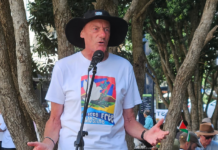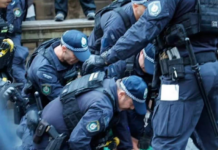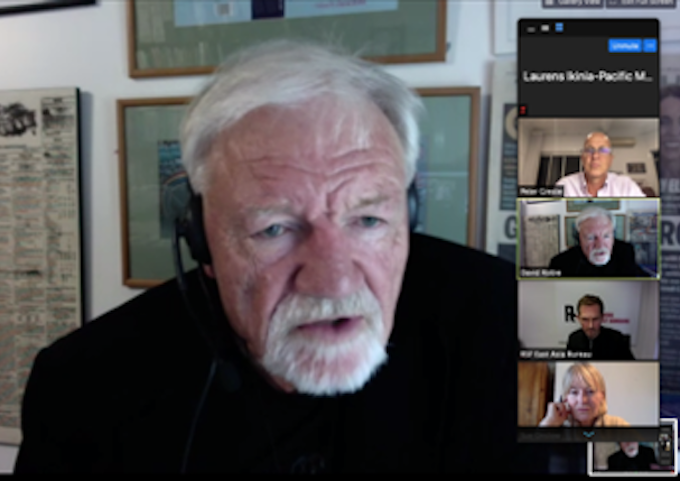
By Laurens Ikinia in Auckland
Media freedom defenders from Commonwealth countries have criticised many governments across the world that threaten and censor the work of journalists.
A virtual conference on media freedom in the Commonwealth was hosted by the Institute of Commonwealth Studies (ICwS) in a webinar in London this week.
Three speakers condemned Chinese pressure “behind the scenes” on Pacific media and in Southeast Asia, the “backsliding” of media freedom in Australia, and raised the West Papua “self-determination” issue in the opening panel of the day-long webinar.
- READ MORE: Global journalists are increasingly faced with punitive media laws
- A crusade for media truth and justice
The speakers, UNESCO professor of journalism at the University of Queensland, Peter Greste, who was jailed in 2013 by the Egyptian regime while he was a foreign correspondent covering the Arab Spring for Al Jazeera English; Pacific Media Centre director Professor David Robie and editor of Pacific Journalism Review; and Reporters Without Borders East Asian bureau chief Cédric Alviani, who has lived in Asia since 1999, gave robust criticisms.
Media freedom has been taken up as a serious issue in Commonwealth nations, such as in the United Kingdom, Canada, Australia, New Zealand, and other countries.
Conference facilitator Professor Philip Murphy, who is also director of the institute, said people from across the world were “using technology to bring in speakers from right across the Commonwealth – it is a fantastic opportunity”.
Panel chair Sue Onslow said a key objective of the institution had been exploring how serious the Commonwealth cared about media freedom.
Open dialogue on ‘free flow’
“The Commonwealth charter signed in 2013 affirmed the members’ commitments to a peaceful and open dialogue on the free flow of information, including free and responsible media,” said Murphy.
The opening speaker, Professor David Robie, who is also convenor of the Pacific Media Watch freedom project at Auckland University of Technology, said Pacific governments were becoming increasingly “authoritarian” in dealing with the media, making it difficult for journalists to work independently and securely.
He condemned the Solomon Islands government’s decision this week to ban Facebook because of “abusive language” and “character assassination” against politicians, saying that little thought had begin given to implementing such a draconian gag.
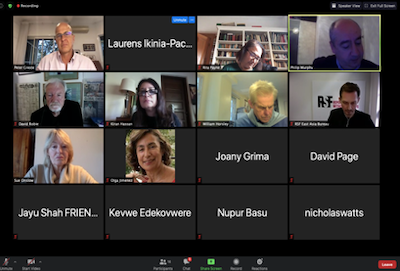
Dr Robie said Facebook and social media were vital for communication in the region and for many small media organisations that had integrated social media strategies into their news operations.
The Solomon Islands government itself was using Facebook for communicating with the public.
Dr Robie also criticised China for its media policies in the region, saying there had been “a trend in clamping down on Facebook in a number of countries in the Pacific” emulating a mainland Chinese lead.
He cited the Facebook threatening moves in Papua New Guinea and Samoa and the ban in Nauru as examples of Chinese influence.
China ‘undermining’ media norms
“China is undermining the long-established independent media freedom norms,” he said.
There was speculation behind the scenes about the influence from China over governments because of extraction industries, such as logging, in an attempt to force silence.
“So, there is a worry and I think an increasing worry in the region about this,” said Dr Robie.
He also criticised the lack of coverage in Commonwealth countries such as Australia and New Zealand about issues concerning Pacific nations such as the decolonisation issue for French Polynesia, New Caledonia – “and especially West Papua”.
“These issues are becoming increasingly critical issues for the Pacific media with a particularly strong proactive line on this around the Pacific about West Papua, a cause célèbre if you like.
“Of course, it’s difficult because it is regarded as part of Indonesia and sometimes the statistics around media freedom issues in West Papua are hidden across statistics in Indonesia as a whole,” Dr Robie said.
He said that despite the lack of coverage from mainstream media in the region, West Papua was increasingly an issue for the independent Pacific media.
West Papua will be ‘big issue’
“This will become a very big issue in the next few years,” he said.
“Globally, you get international news organisations like Al Jazeera covering West Papua while much of the mainstream media in Australia and New Zealand don’t. Pacific nations news media are taking it up it as a critical issue for them.”
Professor Peter Greste , who is also spokeperson for the Alliance for Journalists’ Freedom, said that the practice of journalism was now being “weaponised” with anti-terrorism laws such as introduced by the Australian government.
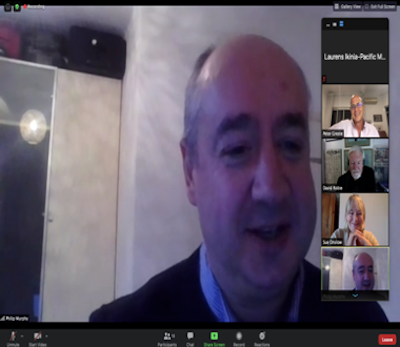
He recalled his experience while working in Egypt before he was jailed for 400 days over alleged “terrorism” and then deported.
Governments were increasingly taking national security legislation as an anti-terrorism law and using it to “come after the journalists”. Two of his Al Jazeera colleagues were still in jail in Cairo.
“I started to realise what was happening in Egypt was one of the greatest examples of the kind of things that were taking place all over the world. Not just in an authoritarian regime like Egypt or Turkey or China where journalists were being locked up with great impunity, but equally in liberal Western democracies, including here in Australia.”
However, Professor Greste said some progress had been made about reforming such laws.
Law reform progress in Australia
“We are seeing some progress here in Australia to change the law, at least getting some legislative reform. In Australia, there is an opportunity to move.”
Reporters Without Borders’ Cédric Alviani said that citizens had a fundamental right to information, it was not just an issue about media freedom for media owners.
“We have to insist that press freedom is the freedom of the people to receive quality information, and somehow it should be called Freedom of Information – or maybe under another name – but somehow it would be less confusing as it’s a right of the citizens. It is enshrined in article 19 of the Universal Declaration of Human Rights,” he said.
“I believe we should start from the public spaces. Politicians or decision takers will only do this if it suits their interests, so I would say the public has to push for this. This is a right, and we have to push for our rights because every other person basically has an interest to remove this right.”
Alviani said that it was important for journalists to be accountable for their work as otherwise they would amplify disinformation and lead to a negative impact.
“Disinformation can boost the national security threat and only journalists can debunk fake news before it has become viral,” he said.
“If the journalists don’t do their job properly, they are going to amplify fake news, instead of debunking it.”
The seminar included panels on South Asia, Africa, Europe and Canada, the Caribbean with more than 16 journalists and media freedom defenders taking part, and with a large audience.
Laurens Ikinia is a Papuan Masters in Communication Studies student at the Auckland University of Technology who has been studying journalism. He is on an internship with AUT’s Pacific Media Centre.



























